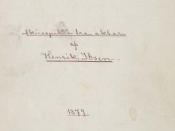A close study of the techniques used to portray the characters of Ibsen's A Doll's House has led me to key insights in regard to the relationship between the individual and society in 19th century Europe. Society at this time was extremely patriarchal, where men were the leading figures in the community and household. Income, status and hence reputation were far more important than anything else to the majority. Women and wives were a distant second, as though merely possessions. So predominant were these values that the individual was ultimately constrained by society, controlled almost entirely by its institutions. This I will show by; detailed analysis of the composer's presentation of Torvald and Nora Helmer with reference to other minor characters where necessary; and mention of different readings of the text, which further reflects ways of thinking in 19th century Europe.
Torvald holds a clear understanding of the importance of security in his society.
"A secure job, a good income - isn't it wonderful?" The word 'it' labels a secure job and a good income as being 'wonderful' in Torvald's view. A gleeful tone is attached to his question, which communicates a true sense of happiness and content on Torvald's part. Torvald also says these words rather out of place in the conversation with Nora, changing the subject from the joys of Christmas and his children to himself. This juxtaposition allows the audience a glimpse of Torvald's self-centred nature and highlighting that his true happiness arises from security. We are presented with a somewhat self-centred man who is most proud of his security, and thus status in the community. This demonstrates the high value placed on occupation, income and hence security by males in 19th century Europe.
As the play's title alludes to, Torvald is extremely possessive...


